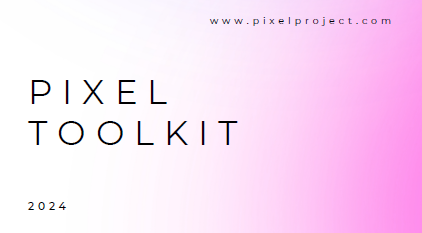Pixel Toolkit – First release
The first draft of the Pixel Toolkit was produced in English version.
It is the main project result of the Pixel project. It is designed for freelancers and individual artists, professionals, and companies working in the Cultural and Creative sector with contents, materials, and tools supporting proper and safe access and use of blockchain and NFTs.
The methodology employed in producing this document is as follows:
– Focus groups were conducted in each participating country (Italy, Bulgaria, and Lithuania) to highlight the most relevant and common topics, contents, and tools related to the use of NFTs for CC companies in the partner countries. 15 respondents, including freelancers, individual artists, and professionals working in the CC sector participated in these activities.
– The lead partner, Learnable, compiled all the findings and generated a comprehensive report summarising the key insights.
– The structure of the Toolkit was defined and shared with the partners. Subsequently, the contents of the Toolkit were developed through collaborative efforts among the Pixel partners, with each contributing to its creation based on their respective expertise.
The Toolkit is structured into distinct chapters, covering the following themes:
- The benefits of blockchain and NFTs for CCIs and companies, freelancers and individual artists: This chapter shows methods to increase visibility and broaden audience reach using NFTs, with a focus on both companies and individual artists. Additionally, it includes exploring the use of NFTs to protect copyright and intellectual property rights, with practical illustrations. Furthermore, it examines different avenues for monetization facilitated by NFTs, such as direct sales, royalties, and collaborations, and offers an extensive list of monetization strategies.
- How to properly access and use NFTs (practical guide): This chapter serves as a guide for navigating the complex world of NFTs. It explores the fundamentals of NFTs, including crypto wallets and digital art marketplaces, offering step-by-step instructions for minting NFTs using Phantom Wallet on Mallow.art marketplace.
- Business development and resilient strategies using NFTs: This chapter introduces different approaches to using NFTs for fostering business growth within the culture and creative sectors. It explores the application of NFTs in marketing, brand development, and community interaction, particularly emphasising social media tactics and collaborations. Furthermore, it investigates innovative NFT applications beyond digital art, spanning music, performance arts, gaming, royalties, collectables, and social impact endeavours. Additionally, it examines how NFTs bolster economic resilience for artists and creators by diversifying income streams and broadening market access. Lastly, it addresses environmental concerns linked to blockchain technology, exploring sustainable practices and eco-conscious solutions.
- Case Studies: Offering real-world insights, this section presents exemplary case studies of successful NFT projects, offering valuable insights and inspiration for freelancers and individual artists, professionals, and companies working in the CC sector in proper and safe access and use of blockchain and NFTs.
You can check out the English version using this link. Translated versions in the partnership languages will also be released shortly.
If you have any suggestions or changes to the document’s contents, please write to us at the following email address: giulio@learnable-europe.eu.
To stay updated on project developments, follow the project’s social media page on Facebook (Pixel project), Linkedin (Pixel project eu), and website.
Enjoy the reading!
Here are the new KA2 application forms for Call 2022

Here are the new KA2 application forms for Call 2022
The European Commission has published samples of the NEW electronic application form for KA2 under the Erasmus + Programme.
The NEW application forms are available for consultation to help you prepare your application for the upcoming 2022 call for applications.
Below you can find the list:
-
Call 2022 Small-scale partnerships in youth KA210-YOU applications sample
-
Call 2022 Small-scale partnerships in school education KA210-SCH applications sample
-
Call 2022 Small-scale partnerships in adult education KA210-ADU applications sample
-
Call 2022 Cooperation partnerships in youth KA220-YOU applications sample
-
Call 2022 Cooperation partnerships in school education KA220-SCH applications sample
-
Call 2022 Cooperation partnerships in higher education KA220-HED applications sample
These documents represent a sample of the application, which means that some questions may still vary when you go complete the online webform. They must not be used for real applications to your National Agency.
To stay up-to-date on these topics, subscribe to our Mailing List.
Two Minutes Tuesday - Tool#1 - Save time with our automatic timesheet template for Erasmus+ projects
Two Minutes Tuesday - tool#1 - Save time with our automatic timesheet template for Erasmus+ projects
With the “Two Minutes Tuesday – Tool” articles we want to share with those of you who are actually managing Erasmus+ projects some tools that can make the work easier.
As you know, timesheets are very important for monitoring the project costs and must be provided as supporting documents to your National Agency in case of auditing.
Coordination and management of an Erasmus+ project can be complex and having the right tools can make the difference. For every project we managed we used to spend a lot of time describing to non-expert partners how to fill-in timesheets.
Regardless of the time spent in presenting to project partners how to properly fill in the timesheets, there were a lot of mistakes and doubts.
Most of the mistakes were about what kind of activities are to be included in timesheets (please, don’t include dissemination activities in timesheets!), the appropriate daily rate and staff category.
Then we decided to create our own template with the aim of reducing errors and mistakes. Here is an automatic spreadsheet which will help you manage the project costs in a more efficient way. You can easily adapt it to your needs and context!



